 |
THE 9TH OF MAY: THE GREATEST FEAT OF A COUNTRY THAT NO LONGER EXISTS
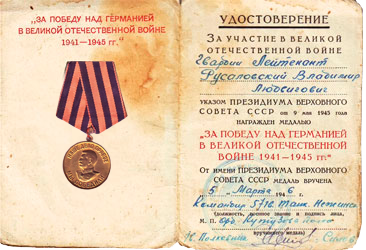
A document certifying that Lieutenant Vladimir Rusalovsky was awarded
a medal "for winning the victory over Germany in the
Great Patriotic War of 1941-1945" on 9 May 1945. However, he was
only presented with the medal almost a year after, on 5 March 1946.
The modern St. George Ribbon's pattern is based on this medal, which is
inscribed with the words: "Our cause is just, we have won!"
World War Two affected almost every continent, claiming the lives of 17 million soldiers and twice as many civilians. It was the first truly global war. What is less common knowledge, however, is the significance of the USSR's role in WWII, during which 80 per cent of Germany's war losses was incurred due to the Soviet Army, and only 20 per cent due to the Allies. Known as Eastern Front to English speakers, it is termed the Great Patriotic War in Russia and many former Soviet republics, for our grandfathers, irrespective of race and ethnicity, fought for their then common homeland. From 1940 to 1945, the Soviet people did the impossible to protect themselves and many European nations from extermination by the Nazis, who viewed the Slavs and Jews as inferior peoples and, as such, dispensable.
The Eternal Flame of People's Memories
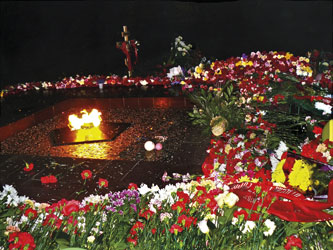
The Eternal Flame in a provincial Russian townEvery Russian city and many provincial towns hold military parades on the 9th of May, to which WWII veterans are invited as guests of honour. Recently, a new tradition was launched in the form of the St. George Ribbon Action. Black-and-orange striped ribbons, whose pattern is widely associated with certain Soviet awards, are given out for free to wear on wrists, handbags and cars every May in preparation for the celebration. This act is to ensure that new generations do not forget what price the country had paid to gain victory and that we are its proud descendants.
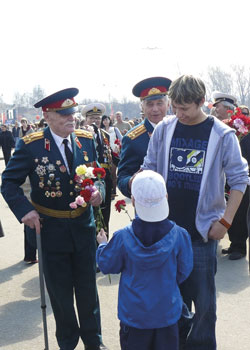
Russian children pay theirrespects
to the few remaining war veteransA minute of silence is usually observed in tribute of the fallen during WWII at the Eternal Flame. This war monument with a gas torch burning constantly to symbolise people's never-dying memory can be found in every Russian city and town. Never devoid of floral offerings all year round, it is piled high with flowers every 9th of May.
Such is the more official and grander part of Victory Day celebrations in Russia. On a more intimate, personal note, this day is observed in schools and in families, who have carefully kept grandparents' orders, medals, letters and faded photos for 65 years now.
Inna, 33, a photographer from Moscow, says: "In Russia, kids are told about WWII as early as kindergarten, where they bring their great-grandfathers' photographs and medals for show-and-tell on the 9th of May. Together with their parents, children write short poems about the war."
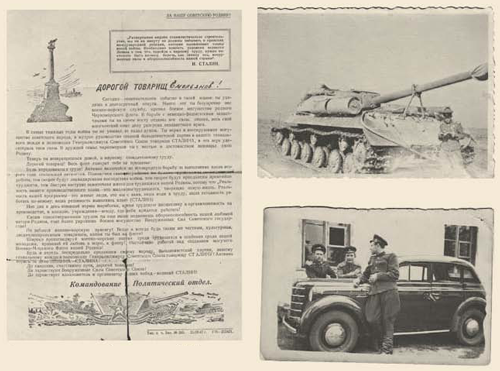
A Soviet motivational note to a marine called Emelyanov demobilised in 1947 thanking him for his military courage and prompting him to continue contributing to the country's post-war restorationMaria, 34, a mother of an eight-year-old girl, told us: "On the 9th of May, we buy lots of flowers and give them to every war veteran we meet on the streets, saying 'thank you' to them. Everyone is joyful and inspired on this day. The veterans also come to schools to tell kids their first-hand accounts of the war."
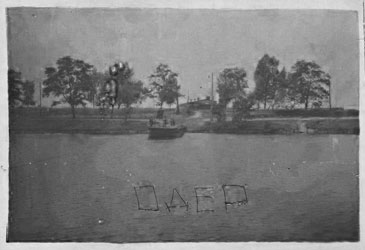
The word "Oder" in Russian is scratched onto the surface of this photo.
The forcing of the Oder, a river between Germany and Poland,
by the Soviet Army preceded its advancement towards Prague
and Berlin to free the cities from the Nazis in 1945
Angelica, 40, a history teacher from Petrozavodsk, believes that a personal approach to historical events helps children connect to the country's past and feel that they are a part of the victory that unites families and nations. This helps to escape the danger of the holiday becoming a one-day event, forgotten as soon as the flowers at the monuments wither. She confesses, "I can hardly keep tears from running when telling my students about the Great Patriotic War, as my own grandparents had fought in it. I am happy to see that the class responds with sincerity and compassion. With 26 million Soviet people having perished during WWII, hardly any family remains untouched."
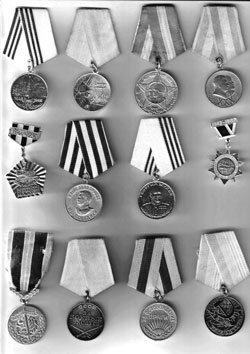 Mikhail, 22, considers the 9th of May to be a day of mourning, for any war is a disaster and a time of great sorrow. He says, "We should see from history that only a nation which is united can overcome a mighty enemy and come to understand that the greatest victory is not to win the war but to prevent one from happening."
Vladimir, 40, from Rostov-na-Donu, believes this holiday to be of great significance, both as part of patriotic education and an opportunity to learn important lessons from the past. He says, "The war was unleashed by governments, but it was the common people who fought and suffered in flesh and blood, and we should be proud of them. My 10-year-old students take a vivid interest in the Great Patriotic War and are willing to share stories told by their great-grandparents."
Katerina, 32, a designer from Voronezh, once celebrated the 9th of May in Egypt by singing Victory Day, a popular Soviet song, just to herself. She reveals, "So strong and spontaneous was the urge to be connected with my country on that day that I had my Russian friends text me all the lyrics."
Fears and Hopes
There is a rotten apple, though, as the 9th of May in Russia is becoming commercialised, taking on ugly forms that are sometimes absurd and offensive. Last May, one Russian company offered war veterans a discount for double-glazing panels manufactured in Germany. A watchmaker in Russia issued a commemorative wrist watch, which had to be discontinued after veterans had pointed out that its dial sported German machinery, not Soviet. But as long as such attitudes and actions are not condoned by Russia's general public and mass media, and the memory of the greatest victory is passed on to younger children as early as kindergarten, the 9th of May is destined to maintain its original significance.
P. S. The old photos belong to the authors' families, while the modern ones are courtesy of the authors' friends, Olga Sherehova and Gleb Osipov.
Text by Natalia Makarova, Julia Sherstyuk
|
|
 +65 6696 7068
+65 6696 7068
 info@meridian103.com
info@meridian103.com
 PDA
PDA
 +65 6696 7068
+65 6696 7068
 info@meridian103.com
info@meridian103.com
 PDA
PDA
